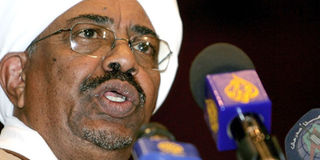Bashir hunters seek to tighten the noose as he plans to travel

Sudanese President Omar al-Bashir. AFP | NATION
UN, Saturday
The International Criminal Court faces a new battle of wills this week with Sudan’s President Omar al-Bashir even as its top prosecutor says the wanted leader is increasingly encircled.
Bashir, who faces ICC warrants for genocide, war crimes and crimes against humanity in Darfur, has been invited to a summit in Zambia on Wednesday and to attend a festival in Senegal later this month.
ICC statutes dictate that any member country should arrest him if he visits. Bashir is defiant, however, the African Union supports him, and this year he has been to Kenya and Chad, both signatory countries which refused to detain him.
“President Bashir will continue to travel, nobody will be able to restrict him,” Sudan’s UN ambassador Daffa-Alla Elhag Ali Osman said. Following ICC complaints and some international pressure, some diplomatic doors have closed, however.
An October summit of an East African group had to be moved from Kenya to Ethiopia, a non-signatory, so that Bashir could go. Sudan boycotted an AU-European Union summit in November because of European threats to walk out and a visit to Central African Republic this month never went ahead.
South Africa and Uganda said they would arrest him if he went there. “He is not under house arrest, he is under country arrest,” ICC chief prosecutor Luis Moreno-Ocampo said as court signatory countries met at the United Nations.
“When he is outside, he flies with half the air force because he knows he can be arrested,” Ocampo told AFP. “Bashir will be arrested,” added the prosecutor who has insisted that the genocide in Darfur is still going on, but will stand down in 2012 and knows that he may not see the end of this battle while in office.
Ocampo has asked the ICC to inquire about reports that Bashir could attend summit of Great Lakes Region leaders in the Zambian capital on Wednesday, diplomats said.
“Zambia invited him but it is not saying clearly what it will do if he goes. This will be a test of the new trend against Bashir,” said one Security Council diplomat. Human rights groups in Zambia have criticised the government for making the invitation.
Zambia is an ICC member, as is Senegal, where rights groups have also opposed a government invitation to Bashir to attend an arts festival. Bashir “is finding himself a prisoner in his own palace” because of the “dis-invitations,” according to Richard Dicker, Human Rights Watch’s head of international justice.
“While there is a long way to go to him before he is a prisoner at the ICC or appears at its dock, it suggests a greater isolation for the president of Sudan than I believe he ever expected.
“I think what is necessary is for him to become increasingly a pariah in the international community, among African states, so there is the recognition that his leading role is more of a liability for the people of Sudan,” Dicker added.
Unlike the limited-term international tribunals for the former Yugoslavia and Rwanda, the ICC is a permanent court. “It is not going to go out of business,” said Dicker. “So whether it is four years or five years or 20 years that warrant will be in place and at some point the conditions will come together for this individual’s arrest and fair trial.”
Some analysts, though, say the international community is not doing enough to bring Bashir to justice over Darfur, where the UN says at least 300,000 people have died since 2003. John Prendergast, co-founder of Enough, an anti-genocide activist group, expressed disappointment at the “sporadic and erratic” resolve of the international community despite Ocampo’s recent victories.
“There has to be some kind of repercussion for a country that will allow him to visit, especially if they are signatories to the ICC. So the noose seems a little loose still and that could be tightened,” he said.




